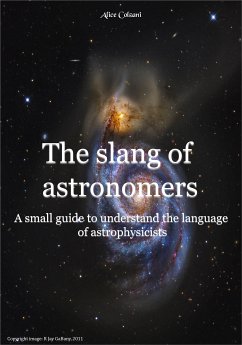When I meet new people and tell them that I am an astrophysicist, I get more or less the same reaction. "Oh wow, how cool! But then you could explain that thing to me... ". And I don't mind either, since I love talking about astronomy to anyone who wants to listen to me. Because, needless to deny it, everyone at least once in a lifetime looked up at those glowing dots and started wondering about them. And when there is a new discovery, so important to even finish on the news, the interest rekindles for a while.
But if you try to go a little deeper, sometimes you come across a trivial but at the same time complex problem. Astronomers often use terms that don’t belong to everyday vocabulary. Or, worse, they use banal words with a completely different meaning. I realize it very well when I answer questions in those informal contexts. I am often forced to make long introductions for topics that may have little to do with the question, but which are fundamental to understand the answer. Or, as I speak, I must stop to specify some terms. Because for the specialists these words are obvious, taken for granted. But the person who approaches astronomy only out of curiosity certainly does not know all those specific terms.
That's why I thought of creating a sort of English-Astronomical dictionary. To understand the astronomy conference held by the club of your city, or to read the captions of the photos published by NASA or ESA, or even to understand that astronomy text left on the shelf for years.
What you will find in this book covers many fields, from the definition of distances to the explanation of how to take astronomical photos. Maybe not everything will be interesting for you, but nobody ever tells you to read all the chapters. You could just read one or two of them, just enough to seem cultured in front of friends. Or to be able to start a speech while looking at the stars with the person you like.
In short, what follows is a small manual to help you to better understand some of the more basic terms of astronomy. I hope you can learn something in a funny way.
But if you try to go a little deeper, sometimes you come across a trivial but at the same time complex problem. Astronomers often use terms that don’t belong to everyday vocabulary. Or, worse, they use banal words with a completely different meaning. I realize it very well when I answer questions in those informal contexts. I am often forced to make long introductions for topics that may have little to do with the question, but which are fundamental to understand the answer. Or, as I speak, I must stop to specify some terms. Because for the specialists these words are obvious, taken for granted. But the person who approaches astronomy only out of curiosity certainly does not know all those specific terms.
That's why I thought of creating a sort of English-Astronomical dictionary. To understand the astronomy conference held by the club of your city, or to read the captions of the photos published by NASA or ESA, or even to understand that astronomy text left on the shelf for years.
What you will find in this book covers many fields, from the definition of distances to the explanation of how to take astronomical photos. Maybe not everything will be interesting for you, but nobody ever tells you to read all the chapters. You could just read one or two of them, just enough to seem cultured in front of friends. Or to be able to start a speech while looking at the stars with the person you like.
In short, what follows is a small manual to help you to better understand some of the more basic terms of astronomy. I hope you can learn something in a funny way.









